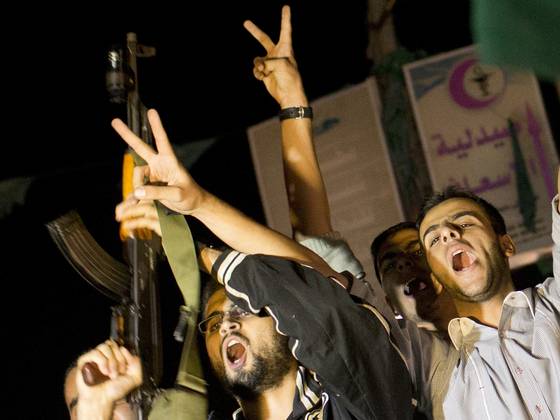![]()
RubinReports | By Barry Rubin

Hamas’ supporters celebrate the announcement of a cease-fire between Hamas and Israel in Gaza City, on Wednesday, nov 21, 2012. (Photo: Bernat Armangue, AP)
Naturally the question of who won any given war preoccupies people’s minds. And I’m amused by those who think that Hamas won the recent conflict. Winning has to mean something real, not just bragging to reassure oneself.
Let’s begin by examining the causes and goals of each side. Hamas’s goal was to be able to attack Israel as much as it wanted without significant retaliation. This time, as in late 2008, the war began because Hamas escalated the level of its attacks on Israel to unacceptable levels (more on that phrase in a moment). The same might be said of Hizballah in 2006.
Israel’s goal was to force Hamas to the lowest possible level of attacks and to make such attacks as ineffective as possible. Incidentally, that was also Israel’s strategy in dealing with the PLO. Attempts to “solve” the problem once and for all, varying from the 1982 invasion of Lebanon to the Oslo peace process of the 1990s didn’t work too well.
Nevertheless, Israel was able to achieve its more limited aim against Hamas in the later 2008-early 2009 campaign to gain four years of relative quiet. With Hizballah, this goal has now held for six years. That’s not bad given the reality of contemporary international politics and the Middle Eastern situation, both of which keep Israel from gaining a “total victory.”
Ideally, of course, there is no good reason that the world ensure the survival of a terrorist, totalitarian, illegal, and genocide-oriented regime in the Gaza Strip. Nevertheless, that is the reality. If the idea of Israel going in on the ground into the Gaza Strip provoked so much international horror, imagine the reaction to Israel overthrowing Hamas altogether.
And for Israel to overthrow Hamas it would either have to govern the Gaza Strip itself, restarting the whole post-1967 process and facing daily gun battles there or to turn over the territory to someone else. Since the Palestinian Authority isn’t interested in such an arrangement and is incapable of even making a serious effort to overthrow Hamas nobody else is going to do so or take power there.
So Hamas’s survival as ruler of the Gaza Strip was not some victory in a war that lasted a little over a week but is guaranteed in effect by the international and regional order. Can Hamas continue to violate the ceasefire? Of course, because Israel’s only way of enforcing it is military retaliation and now, as has been true for the last five years, Israel has to consider how to do each one without being blamed for a breakdown in the ceasefire. That won’t stop Israel from hitting back with the goal of minimizing Hamas’s attacks.
After these two significant factors — which both existed beforehand — it’s all downhill for Hamas. Given the destruction of its weaponry, Hamas is less able to attack than it had been and while every Hamas leader denies it, the vision of their colleagues getting killed does have a deterrent effect on their boldness.
The amount of regional support Hamas received during the recent war was remarkably low. The anti-Islamist Arab states wanted Hamas to lose. Iran cheered and sent missiles which is quite significant but only gets you so far. The Arab street didn’t do much; Syria’s regime is busy with the civil war; Iraq is for all practical purposes out of the conflict. Whatever lip service it gives, the Shia Islamist Hizballah didn’t lift a trigger finger to help Sunni Islamist Hamas.
It was these factors that led Fareed Zakaria, the influential American commentator — no friend of Israel — who has Obama’s ear to write a Washington Post piece entitled, “Israel dominates the new Middle East.”
As for Egypt, while the Muslim Brotherhood regime is 100 percent pro-Hamas, it isn’t going to be dictated to by its much smaller brother. The Egyptian government has bigger fish to fry. It is busy consolidating its dictatorship and reeling in almost $10 billion in foreign aid.
Hamas didn’t consult Cairo over the escalation that led to this war. Equally bad, Hamas has become entangled with small jihadist groups that attack both Egypt and Israel. Naturally, the Cairo government doesn’t care if Israel is the only target but reacts strongly to being hit itself. So before the escalation the Egyptian government was angry at Hamas.
There will be times in future when Cairo will give Hamas full backing but this wasn’t one of them. Moreover, it seems that the Egyptian government has committed itself to crack down more on arms’ imports across the Egypt-Gaza border. Of course, that promise might well not be kept — if only for the bribes paid to Egyptian military officers by smugglers — but retaining the status quo is hardly a victory for Hamas.
The supposed greatest military achievement of Hamas was sending missiles in the direction of Tel Aviv and Jerusalem. Yet this was accomplished by taking out most or all of the explosives in order to extend the range. The Iron Dome system shot down most of these and little damage was done.
By the end of the war, Hamas was apparently out of missiles (though not shorter-range rockets). It had lost a lot of cadre and needs to rebuild part of its infrastructure and most of its arsenal. Israel faces no such problems. In addition, Israel continues to prosper and advance while the Gaza Strip, in part thanks to Hamas’s own strategy, continues to stagnate.
Of course, Hamas did manage to terrorize a million Israelis in the south and close down normal life there. This is an accomplishment but something Hamas also did in 2008-2009 with more effectiveness since there was no real anti-missile defense. Everyone knows that Hamas can do this.
How does that advance Hamas’s cause of wiping Israel off the map?
And Hamas is no closer to taking over the West Bank than it’s been in the past, in no small part because of Israel’s behind-the-scenes efforts. Also of tremendous significance is the fact that the war did not increase Hamas’s legitimacy with the West. If anything, the opposite is true. While one can find plenty of objectionable Western media coverage, it was less hostile to Israel than in 2006 or 2008-2009. Part of the gain is due to the fact that the Israeli government and military have finally learned how to use social media effectively.
At any rate, no one in the West is rushing to have diplomatic relations with Hamas or help it out beyond letting it continue to exist and, of course, terrorize the people of the Gaza Strip and teach children to grow up to be terrorists. It is a disgusting situation but not one amenable to change by Israeli action.
So Israel won the war. The problem is that the word “won” has limited significance and “winning” doesn’t remove the problem and bring long-term peace. That, however, is in the nature of the situation and not in the war itself.
This inability to obtain total victory is characteristic of Israel’s strategic situation for reasons totally extraneous to Israel and which virtually everyone in the country understands, though many foreign observers don’t. Israel’s big victories in the 1967 and 1973 war did not end the conflict or stop attempts by terrorists to attack into the country. The goal is to discourage them and make it harder for them to succeed.
As a result, Israelis can go about their lives and the country can prosper. Sixty-four years of effort have devastated Israels enemies but brought them not one step closer to wiping it off the map.
The danger regarding the Gaza Strip is longer-term. As the Brotherhood consolidates control over Egypt and if a Muslim Brotherhood regime comes to power in Syria, there might come a day when Hamas has real support from two powerful Arab states plus Iran. The situation might then resemble that which Israel faced from Arab nationalist governments in the 1950s-1980s period.
Israel’s goal, then, is also to deter even the most hostile, hate-filled Egyptian Islamist regime from going too far in trying to implement the Muslim Brotherhood’s genocide program. Its cheering Hamas is not the problem. The issue is how much it will help Hamas and, even more important, whether it will some day fight alongside it. Has this deterrence been increased by the recent war?
Apparently, yes, and that is a very important outcome. Israel has reminded Egypt of its own power; Hamas has showed its Egyptian sponsor that it was not a good team player. Perhaps the better way to put it is that Israel won the battle but the war goes on, as indeed it has for our entire lifetimes.
Barry Rubin is director of the Global Research in International Affairs (GLORIA) Center and editor of the Middle East Review of International Affairs (MERIA) Journal. His latest book, Israel: An Introduction, has just been published by Yale University Press. Other recent books include “The Israel-Arab Reader” (seventh edition), “The Long War for Freedom: The Arab Struggle for Democracy in the Middle East” (Wiley), and “The Truth About Syria” (Palgrave-Macmillan). The website of the GLORIA Center and of his blog, Rubin Reports. His original articles are published at PJMedia.



 RSS
RSS










Latest Comments
Hello Mike, Thank you for your positive feedback to the article. I felt there wasn’t too much critical analysis of ...
Thanks for this considered and well constructed article. A follow up article on the manner in which the editorial contro...
THE CLUELESSNESS OF CLAIMING THAT OBAMA'S MIDDLE EAST POLICIES WERE A FAILURE CANNOT BE FURTHER FROM THE TRUTH, WHAT THE...
As long as Obama is the president of the usa do not trust the us government......
Thank you for an good read....